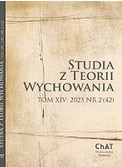Populism, counter-democracy, and counter-education. Notes on the imagination about antidote to the crisis of liberal democracy
Populism, counter-democracy, and counter-education. Notes on the imagination about antidote to the crisis of liberal democracy
Author(s): Rafał WłodarczykSubject(s): Political Philosophy, Philosophy of Education, Pedagogy
Published by: Wydawnictwo Naukowe ChAT
Keywords: populism; counter-democracy; crisis of liberal democracy; counter-education; civic education; theory of education; critical pedagogy;
Summary/Abstract: Despite the convergence in the wording, the concepts of Ilan Gur-Ze'ev's counter-education and Pierre Rosanvallon's counter-democracy remain independent of each other, but they have a common denominator, which, in my opinion, allows us to look at the complexity of the relationship between education and populism from a pedagogical point of view and perceive its ambiguity. As for populism itself, its media and political understanding most often confronts it with democracy, seeing populism as a kind of threat. In such a context, it is easy to present education in its various form as an unequivocal antidote to the threat so understood. However, some researchers of populism, such as Margaret Canovan, Roger Eatwell, Matthew Goodwin, or Pierre-André Taguieff, recognise the complexity of the relationship between populism and democracy, its ambiguity, which may also help to revise the view on the role of education in preparing citizens to face the populist challenge. Consequently, it can be assumed that the findings of P. Rosanvallon, I. Gur-Ze'ev and M. Canovan allow the question of populism in educational theory and practice to be raised anew. The theoretical perspective I have adopted will allow me, I believe, to develop two propositions: first, that populism is to some extent a development, an increase in the inalienable property of democracy, which in effect turns against itself; second, that this property also characterizes education. This is related to what democracy and education promise us, or what we think democracy and education promise us, and which, if they are lacking, do not arouse our enthusiasm or the interest necessary to defend or develop them.
Journal: Studia z Teorii Wychowania
- Issue Year: XIV/2023
- Issue No: 2 (43)
- Page Range: 341-355
- Page Count: 15
- Language: English

